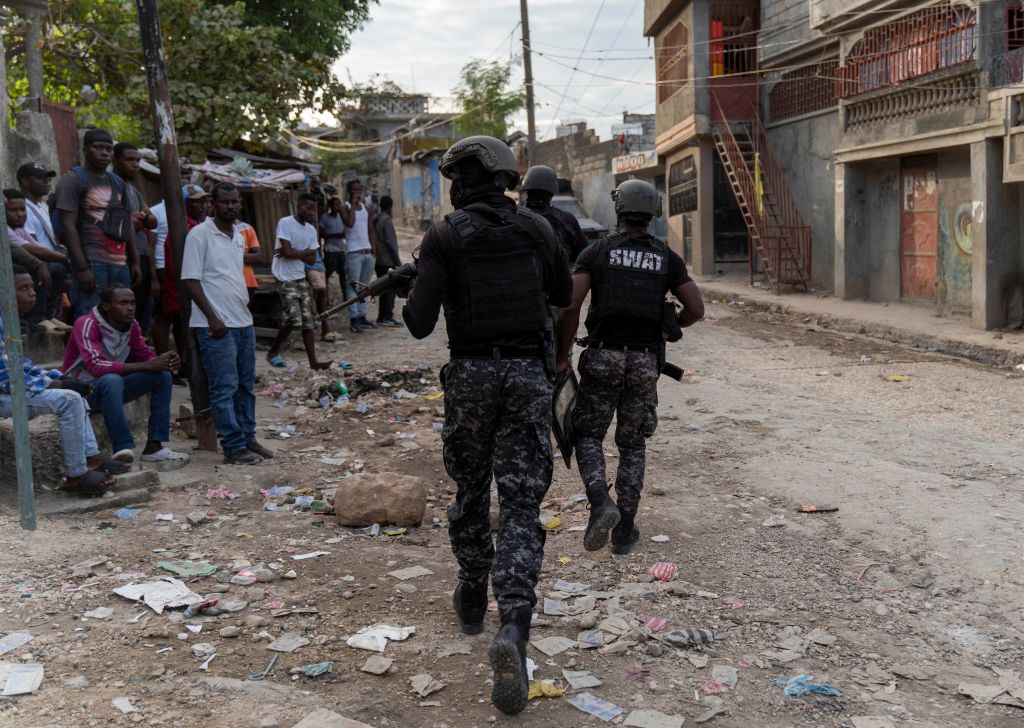Happy Wednesday! Our hearts go out to Tabitha King, who—according to a recent Rolling Stone piece—had to threaten to divorce her husband Stephen to get him to stop playing Lou Bega’s “Mambo No. 5” on repeat while working on his book, 11/22/63.
Quick Hits: Today’s Top Stories
- Officials from the International Atomic Energy Agency (IAEA), the United Nations’ nuclear watchdog, reported Monday that Iran’s stockpile of 60 percent enriched uranium grew by 7 percent last quarter, a slowdown from the 30 percent expansion of the stockpile in the previous three months. That said, Iranian scientists reportedly grew their overall stockpiles of uranium enriched to 5 percent and 20 percent levels, which can easily be enriched to higher levels. The IAEA report also found Iran had diluted more than 5 percent of its highly enriched uranium. The unusual step and general slowdown follow months of indirect, behind-the-scenes diplomacy between Washington and Tehran that potentially constitute efforts to negotiate a new nuclear agreement between the two countries.
- Cuban officials announced Monday they had moved to take down a Russian human trafficking network used to recruit Cuban citizens for the war in Ukraine. “Cuba is not part of the war in Ukraine,” the country’s foreign ministry said in a statement, clashing with its longtime ally. “It is acting and will firmly act against those who, within the national territory, participate in any form of human trafficking for mercenary or recruitment purposes that lead Cuban citizens to raise weapons against any country.”
- President Joe Biden tested negative for COVID-19 again on Tuesday, the White House said, hours after first lady Jill Biden tested positive for the virus on Monday evening. Biden is still planning to travel to India for the G-20 Summit later this week.
- The White House announced Tuesday that Biden intends to nominate Jack Lew—former Treasury secretary and chief of staff to President Barack Obama—to serve as the U.S. ambassador to Israel. If confirmed, Lew—who is currently a managing partner at a private equity firm and chairman of the National Committee on United States-China Relations’ board—would succeed Ambassador Tom Nides, who stepped down from the post last month.
- Congress’ attending physician said Tuesday that, upon examination, he found no evidence indicating that Senate Minority Leader Mitch McConnell had suffered a stroke or seizure during his freezing episode last week, when the senator seemed unable to speak for roughly 30 seconds during a press availability. The Senate returned Tuesday from its August recess as questions mount about McConnell’s health and fitness to continue in his role as the leader of Senate Republicans.
- Texas’ GOP Attorney General Ken Paxton pleaded not guilty yesterday on all 16 articles of impeachment against him. Paxton is being tried in the Texas Senate over allegations of bribery, dereliction of duty, and disregard of official duty. The Senate rejected all 16 of Paxton’s motions to dismiss the articles, as well as a motion to exclude evidence gathered before his most recent election. Texas Lt. Gov. Dan Patrick—the presiding officer at the trial—ruled that Paxton could not be compelled to testify in the trial.
- A federal court in Alabama held Tuesday Alabama’s Republican state legislature’s latest attempts to redraw its congressional maps violated the Supreme Court’s June ruling requiring the creation of a second majority-black district, or something “close to it.” The three-judge panel—which wrote it was “deeply troubled” by the legislature’s seeming disregard of the high court’s ruling—unanimously ordered an independent special master to redraw three options by September 25. Alabama’s attorney general vowed to appeal the decision to the Supreme Court.
- Gabriel Amo, a former Biden White House aide, won the Democratic primary yesterday in a special election to replace Rhode Island Democrat Rep. David Cicilline, who stepped down from his position to run the Rhode Island Foundation. Amo defeated 10 other Democratic challengers and will face the Republican nominee, Gerry Leonard, in the general election this November. In Utah, former state House aide Celeste Maloy holds a narrow lead over former state lawmaker Becky Edwards in an undecided special election to fill a seat held by Republican Rep. Chris Stewart. Stewart announced his retirement in May, citing his wife’s health.
- Former Proud Boys leader Henry “Enrique” Tarrio was sentenced to 22 years in prison yesterday after being convicted of seditious conspiracy and obstructing a congressional proceeding related to his actions in organizing the assault on the Capitol on January 6, 2021. The sentence represents the most prison time given to any of the hundreds of individuals convicted for their role in the attack.
What’s Going On in Haiti?

Late last month, an evangelical Haitian pastor led scores of his followers into battle—the latest in a recent vigilante effort to take on the hundreds of violent gangs overrunning Haiti’s capital city, Port-au-Prince. Armed with sticks and machetes, the group tried to confront the gang members who control the nearby suburb of Canaan. The town, which shares its name with the Biblical land God promised the Israelites, is a settlement started by those who lost their homes in the devastating 2010 earthquake.
The confrontation turned deadly when the well-armed gang fired into the crowd, killing at least seven people. The pastor, Marcorel Zidor, was roundly condemned for his actions, including by the Haitian police and others in Christian ministry in the country. But, “hopeless people make hopeless decisions,” a professor at a Haitian seminary told Christianity Today of the pastor’s efforts.
“Hopeless” is fast becoming a byword for the situation in Haiti. Historically plagued by political instability and poverty—often exacerbated by its earthquake and hurricane-prone location—the country’s already-precarious state of affairs has only worsened since Haitian President Jovenel Moïse’s assassination in July 2021. Though he had but a tenuous grip on power himself, Moïse’s death created a void that was quickly filled by criminal organizations that have brought the country to a standstill as they murder, rape, and kidnap with virtual impunity. The United States is warning its citizens to get out of the country—and Haitian migrants are attempting to do the same. Meanwhile, the United Nations Security Council is mulling an intervention—not for the first time—to stabilize the Caribbean nation, though the proposal currently on the table may prove inadequate to the monumental task.
As dire as the situation may have been prior to Moïse’s assassination—a consistently shrinking economy, contested elections and widespread political unrest, and a murder rate almost double that of the U.S.—it’s only deteriorated further in the aftermath. “It’s the worst it’s ever been in the last … probably 50 years,” says Pamela White, the former U.S. ambassador to Haiti from 2012 to 2015 who spent time in the country in the 1990s as an officer of the U.S. Agency for International Development. There’s no comparing the situation now, she says—even to the years she spent in the country following the 2010 earthquake that killed more than 200,000 people.
Somewhere between 60 and 80 percent of Port-au-Prince is under the control of gangs waging local turf wars for territory and influence. The blocs originally grew out of political rivalries, but “we’re way beyond that now,” Frederick Barton, the former assistant secretary of state for conflict and stabilization operations during the Obama administration, tells TMD. Between January 1 and August 15 of this year, the U.N. estimates at least 2,439 people have been murdered in the country. That’s on top of around 1,000 people who have been kidnapped and some 200,000 more who were forced to flee their homes, including Esther Pierre, who left with her two children in mid-August. “I saw armed men arriving in our neighborhood,” she said. “Those who wanted to fight them were raped, killed, burned.”
The gangs have taken over much of the country’s critical infrastructure, like ports and roads, restricting access to important goods and services. Twice, for example, they have blockaded Haiti’s main oil terminal. Gang members frequently hijack freight trucks, and their control over key thoroughfares has not only made the capital city incredibly dangerous to navigate, but has also created food shortages. A May U.N. estimate suggests roughly half of Haiti’s population is going hungry, and in August, the World Health Organization’s Americas arm reported thousands of confirmed and suspected cases of cholera. “Almost 1,000 people a day are probably dying from malnutrition, from disease, from deferred medical treatment, from direct violence,” Barton tells TMD. “And all of those are addressable problems if you don’t have violence.”
The situation in Haiti is too dangerous for Americans, according to the U.S. government, which in late July issued a Level 4 travel warning and evacuated its non-emergency personnel and families from the island nation. The “ordered departure” came the same day that Haitians crowded the gates of the embassy compound seeking shelter from a shooting in the area. The State Department now explicitly tells Americans not to travel to the country, citing the risk of kidnapping, violent crime, and rampant disease. An American nurse and her child were abducted on July 31 before being released a few days later.
Haitians are trying to leave, too—in many cases fleeing to the U.S. southern border in an effort to gain entry there. The number of attempted crossings tells the story of an intensifying crisis: Since 2021, there have been almost 165,000 U.S. Customs and Border Protection encounters with Haitians at the border with Mexico. In 2021—the year Moïse was assassinated and another powerful earthquake struck the country—47,255 Haitians tried to cross the U.S. southern border. The highest number of monthly crossings in that fiscal year was in September, when there were more than 17,000 encounters with CBP. The overall figure increased in 2022, and again in 2023. Almost 63,000 Haitians have been apprehended to date this year, as the end of the fiscal year—CBP’s reporting period—approaches.
To reduce the chaos at the southern border, the Biden administration introduced an asylum program earlier this year—singling out Haitians, Cubans, Nicaraguans, and Venezuelans—in an effort to encourage would-be migrants to apply from their home country rather than come to the border. Each month, the program allows for a combined 30,000 asylum-seekers from those four countries to come to the U.S. to work no more than two years under the Department of Homeland Security’s parole authority, provided they undergo a vetting procedure, possess a passport, can arrive in the U.S. by plane, and have someone in the U.S. who can sponsor their application.
Those conditions exclude poorer, less-connected Haitians who cross at the border and are being routinely deported back to Haiti, but offer the country’s relatively small middle class a path out of dire straits. But the program may also be contributing to Haiti’s “brain drain,” and attrition among what was already an insufficient number of national police officers. “I was not against the program when it started,” White says. “But there’s no doubt many, many talented people left Haiti because of it and not one really poor, uneducated, desperate person left because of it.”
Pulling Haiti out of its doom spiral is no small task, particularly in the absence of a stable government. Acting Prime Minister Ariel Henry’s term—on a dubious constitutional standing anyway, since Moïse named him for the post to replace then-Prime Minister Claude Joseph days before the president’s assassination—ended in February 2022. In January of this year, Haiti’s last elected politicians’ terms also expired, leaving the country without a single elected government official serving an active term. This past February, Henry promised elections in the next year, but with violence so widespread, they’d likely be almost impossible to fairly and safely administer.
Henry called for international intervention to stabilize the country nearly a year ago, but the request was historically—and politically, and logistically—fraught. Haiti’s past is dotted with instances of foreign intervention, and on two occasions the U.S. has sent troops to the country in the aftermath of coups. This time, however, the U.S. has been reluctant to take the lead. “The White House is understandably gun-shy, given the scale of the problem and the poor record of previous international missions,” Benjamin Gedan, the director of the Latin America program at the Wilson Center, tells TMD. The most recent U.N. peacekeeping mission from 2004 to 2017, led by Brazil, faced accusations of sexual assault and importing cholera.
Kenya recently stepped up, offering roughly 1,000 of its national police officers. Several other Caribbean countries have moved to bolster the Kenyan contingent with several hundred troops united in an effort to quell the gang violence. The U.S. backed the plan, with U.S. Ambassador to the U.N Linda Thomas Greenfield stressing it did not constitute a military intervention. “It is very much a police action to stabilize the country so that the country can get back on the path of democracy,” she said in early August. “[So] that they can move forward with a political process that will lead to a stable government that will be able to deal with the situation in the future.”
However, a delegation of Kenyan officials deployed to Haiti late last month to assess the situation may have come away with more limited expectations of their ability to effect meaningful change. The proposal now seems more likely to consist of protecting key infrastructure like ports, airports, and roads—a so-called “static protection force” with little hope of reducing violence. The two former State Department officials concurred that sending such a small force would be too little, too late—just another in a long line of failed interventions that haven’t been able to set Haiti to rights. “It’s an unfair assignment,” Barton tells TMD.
White believes the only intervention that might make a difference now is a full-fledged redeployment of the U.N. “Blue Helmet” peacekeepers—like the Brazilian effort in Haiti several years ago—with a clear, more aggressive mandate to restore order, perhaps similar to the force’s 15-year-long mission in Liberia. “I hate that scenario—I wanted them to do a couple of other interventions [earlier], but now we’re beyond that.”
Worth Your Time
- Family policy is an area ripe for bipartisan cooperation, Marc Thiessen and Alyssa Rosenberg argue in the Washington Post. “One of us is a pro-choice liberal who believes pregnancy and parenting are so momentous that no one should be forced to take them on,” the pair write. “The other is a pro-life conservative who believes unborn life is sacred and that the Supreme Court’s decision to overturn Roe v. Wade was a godsend. But we agree that the high court’s ruling in Dobbs v. Jackson Women’s Health Organization guarantees more babies will be born, many of them in challenging circumstances. And we stand together in our belief that Republicans and Democrats must come together to better support these children and their families. Despite the bipartisan goodwill, little family legislation has been enacted. It’s time for Biden and congressional leaders to make this a priority.” The two present a variety of policy proposals to make pregnancy safer, encourage adoption, make having children and childcare less expensive, and establish a paid parental leave scheme to please both Republicans and Democrats. “Nothing in these proposals requires either side to concede its position on the underlying question of abortion. This shows that our fundamental disagreement on one of the most vexing moral questions of our time should not prevent people of goodwill from working together on something most Americans agree on: supporting families.”
Presented Without Comment
Politico: Trump’s Co-defendants Are Already Starting to Turn Against Him
Also Presented Without Comment
Semafor: The [Danish] Company Behind [Weight-Loss Drug] Ozempic is Now Worth More Than the Danish Economy
Also Also Presented Without Comment
NBC News: Apparent Diarrhea Incident Forces Delta Flight to Barcelona to Turn Back
Toeing the Company Line
- In the newsletters: Nick outlines (🔒) how Trump could win in 2024.
- On the podcasts: Jonah is joined by Tom Nichols on The Remnant to discuss Ukraine, what’s motivating Putin, and what it means to be “Never Trump” in 2023.
- On the site today: Drucker breaks down Nikki Haley’s gains in Iowa, Brian Riedl busts the myth that Republican presidents are inherently worse for the economy, and Jonah argues Democrats are taking a big risk with Biden’s age.
Let Us Know
Should the U.S. intervene in Haiti? Should it back another country’s effort?









Please note that we at The Dispatch hold ourselves, our work, and our commenters to a higher standard than other places on the internet. We welcome comments that foster genuine debate or discussion—including comments critical of us or our work—but responses that include ad hominem attacks on fellow Dispatch members or are intended to stoke fear and anger may be moderated.
You are currently using a limited time guest pass and do not have access to commenting. Consider subscribing to join the conversation.
With your membership, you only have the ability to comment on The Morning Dispatch articles. Consider upgrading to join the conversation everywhere.